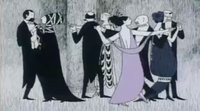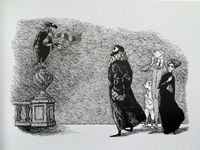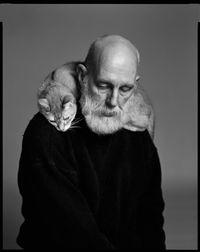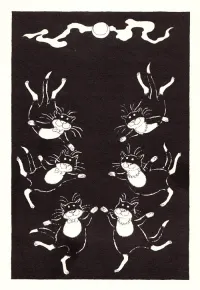"I've always had at least one cat. At the moment I have seven." Edward Gorey drew literal darkness, and occasional hints at evil, and always engineered playfulness - of course he owned and loved cats.
A handful of us Americans still exist (we find each other occasionally and nod quietly) who grew up watching Masterpiece Theatre on our country's public television stations and were lucky enough to stay up to watch the subsequent show, Mystery. And for those of us who lived that quiet Sunday night existence for what seemed like my entire childhood but was only a few years, the most terrifying aspect of the evening (there were many, namely the promise of school on the morrow) was the inky darkness of Edward Gorey's (February 22, 1925 – April 15, 2000) title credits.
 One of many social scenes in Edward Gorey's opening credits for Masterpiece Mystery! Learn more.
One of many social scenes in Edward Gorey's opening credits for Masterpiece Mystery! Learn more.It was a short sequence during which a family of Edwardian distinction is besieged by misfortunes while pursuing Edwardian ideals: drinking aperitifs, playing croquet, and, my favorite - taking a turn in the garden. "Also prominent is heavy masonry, from which, sometimes, a large chunk will dislodge itself and clobber a passerby on the head, killing him instantly," wrote New York Times editor Joan Acocella in her exploration of Gorey's regular motifs. The Mystery sequence was enticing for an imaginative young viewer, not only for the misfortunes but also for the cross-hatched, inky darkness behind the deaths. There is where the murderer lurks. Waits. That was Gorey.
As I aged and eventually moved to England, the longer I stayed, the more I thought Gorey must have been English. There is hinted darkness here: damp corners, a sordid past, thickly lined draperies, the sun's low arc, and the unbreakable haughtiness of class. One of Gorey's earliest books plays with the edgy, surrealist terror of a people not wanting to upset the balance of a system on which they solely exist.
 "Then they saw something standing on top of an urn, whose peculiar appearance gave them quite a turn" from Gorey's The Doubtful Guest.
"Then they saw something standing on top of an urn, whose peculiar appearance gave them quite a turn" from Gorey's The Doubtful Guest.In 1982, Gorey was nudged by the famous English poetry publishing house Faber & Faber to illustrate a reprint of T. S. Eliot's masterful - and darkly satirical - Old Possum's Book of Practical Cats. Gorey had much in common with Eliot: they were both born in the American Midwest, matriculated from Harvard College, and were mildly obsessed with English culture and social class. But Eliot, unlike Gorey, moved to England and lived his life supporting poets like Marianne Moore and Ted Hughes and making his deep resonance in the poetry world with his modern masterpiece The Waste Land. Gorey never lived abroad.
By now, you're probably thinking, 'There was a mention of cats....what does this have to do with cats?' Ah, well, yes. My point is this: Edward Gorey drew literal darkness and occasional hints at evil and yet engineered total playfulness - of course, he also loved and owned cats!
 "Edward Gorey, Cape Cod, Massachusetts in 1992. © The Richard Avedon Foundation.
"Edward Gorey, Cape Cod, Massachusetts in 1992. © The Richard Avedon Foundation.Gorey memorably admits:
I've always had at least one cat. At the moment I have seven. I love them dearly, but I sometimes feel they're largely an irritation, and I seem to spend most of my time screaming at them not to do things, not that it does any good. Whenever I read about people who train their cats not to scratch the furniture, I think, 'Oh, they're very lucky, the cat just doesn't want to.' In my experience, no matter how many times I scream at them not to do a particular thing, they still go ahead and do it.
Gorey not only owned cats, but he also had an outrageous tolerance for their shenanigans. (As I type these words and my cat knocks my book off the desk, I see where Gorey's compulsion to draw falling, heavy objects originated).
Occasionally, due to my own carelessness, they'll ruin a drawing because I'll leave a bottle of ink and they'll walk across the paper. I can't leave a pen open lying on the board because even if mass at the other end of the house, he'll know when I walk away from the drawing board even for a split second, and will rush in to play, with the pens. I'm missing about half a dozen pens.
 "The Rum Tum Tugger is a curious cat." illustration by Edward Gorey for T. S. Eliot's Old Possum's Book of Practical Cats.
"The Rum Tum Tugger is a curious cat." illustration by Edward Gorey for T. S. Eliot's Old Possum's Book of Practical Cats.The response to a "How many cats do you have?" always implies an unspoken "for now." I have two (for now.) My parents had two, then three, then five, then sadly three, then four again... Cat love expands with what I call 'cat velocity,' the rate at which a cat breaks into our hearts and makes herself at home. It is faster than sanity, faster than resource accumulation (and fastest with old, grumpy men if the internet is to be believed).
Doris Lessing collected an entire pride of cats, mostly strays and orphans, that chose her as much as she them (and her cat stories reflect this love).
Gorey experienced the same cat velocity.
When I lived in New York for part of the year in a one-room apartment, I felt three cats was as much as I could handle, although I did end up with six for a year or two. Let's put it this way: I will probably have acquired a few more by the time this book comes out. I have a couple of cousins who live near me, and occasionally, they go off to the ASPCA to get a cat, and I always ask why? Good God, I live in mortal terror of finding more outside, or somebody turning up on my doorstep. With one exception, all of my cats have been strays. People come and say, 'If don't take this cat, it's going to the pound.' God knows I do that myself. When I've come across a stray and I can't any more hats, I blackmail people. You know: 'You owe me one, here's a cat, take it.'
The book Gorey mentions above is a brilliant anthology of essays, On Cats: An Anthology, introduced by the glorious Canadian novelist Margaret Atwood (who also playfully dances around life and death).
 "Jellicle Cats come out to-night / Jellicle Cats come one come all..." Illustration by Edward Gorey
"Jellicle Cats come out to-night / Jellicle Cats come one come all..." Illustration by Edward GoreyT. S. Eliot's cat poems, illustrated by Gorey, are silly-smart rhymes poking fun at cats and (you guessed it) English social classes. But one poem is decidedly about cats and nails that particular thingness of cats: unlike dogs, cats have their own minds. And they do not often share that mind with us.
The Naming of Cats
The Naming of Cats is a difficult matter,
It isn’t just one of your holiday games;
You may think at first I’m as mad as a hatter
When I tell you, a cat must have THREE DIFFERENT NAMES.
First of all, there’s the name that the family use daily,
Such as Peter, Augustus, Alonzo, or James,
Such as Victor or Jonathan, George or Bill Bailey—
All of them sensible everyday names.
There are fancier names if you think they sound sweeter,
Some for the gentlemen, some for the dames:
Such as Plato, Admetus, Electra, Demeter—
But all of them sensible everyday names,
But I tell you, a cat needs a name that’s particular,
A name that’s peculiar, and more dignified,
Else how can he keep up his tail perpendicular,
Or spread out his whiskers, or cherish his pride?
Of names of this kind, I can give you a quorum,
Such as Munkustrap, Quaxo, or Coricopat,
Such as Bombalurina, or else Jellylorum—
Names that never belong to more than one cat.
But above and beyond there’s still one name left over,
And that is the name that you never will guess;
The name that no human research can discover—
But THE CAT HIMSELF KNOWS, and will never confess.
When you notice a cat in profound meditation,
The reason, I tell you, is always the same:
His mind is engaged in a rapt contemplation
Of the thought, of the thought, of the thought of his name:
His ineffable effable
Effanineffable
Deep and inscrutable singular name.
The cat holds something apart, something hidden. The most feeble-minded among us imagine it is their true feelings about us (usually negative), but more likely, it is simply 'What is that smell I'm smelling, and is it food?' Regardless, cats seem to retain something we will never know or control, i.e., domesticate. We gleefully name them, imagining we do not care that we cannot fully domesticate cats... but oh, we do.
My two oldest cats are ginger tabs named Billy and Charlie. The next oldest ones are named George and Weedon; then I have a brother and two sisters named Thomas, Alice, and Jane. They all get along very well together, and they tend to sleep in one great big lump. There are a couple that sit up on my drawing board while I'm working. They're all such good friends. They almost never hiss at each other, but maybe once or twice a day one will hit another one where I can't see them and I'll yell, 'Stop it! Stop it! Stop it!'
Who hasn't emphatically yelled at a cat as if we can remotely command them to do anything? I also noticed that Gorey hopped on the "give cats first names as if they were roommates" trend. Interesting, very interesting. I remember when my parents announced we were getting cats. It was nighttime; we had probably just finished watching Mystery!. We demanded to name the cats Fluffball and Snowflake - like you do. My father presciently exercised his most tyrannical moment of our childhood, naming them after P. G. Wodehouse characters. No Fluffballs in our house.
Didn't matter. We had cats! Two of them. (For now.)


